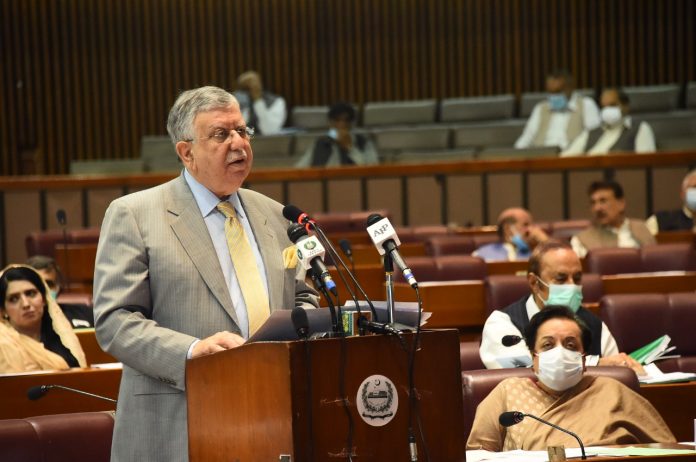LAHORE: The federal government has decided to launch the ‘Kamyab Pakistan’ programme – a multi-dimensional social welfare initiative – at the national level in the next few days.
This was announced by Federal Minister for Finance and Revenue Shaukat Tarin while chairing the third meeting of the Economic Advisory Council (EAC) on Saturday.
The meeting was attended by Minister for Industries and Production Makhdoom Khusro Bakhtyar, Minister for Privatisation Mohammadmian Soomro and Minister for National Food Security and Research Fakhar Imam. Adviser to the Prime Minister on Commerce Razak Dawood, finance and privatisation secretaries and SBP deputy governor also attended the meeting.
It was decided that the program would be launched in the ongoing month and housing projects, skill development and loan schemes, health cards and agricultural loans would be brought under the Kamyab Pakistan programme.
With upto Rs500,000 interest-free loans planned, the finance minister said that four million families nationwide would become a part of the initiative.
“Farmers will receive interest-free loans for improving harvest and other business opportunities,” Tarin said, adding that the population in provinces would also get universal health coverage.
“This is the biggest social welfare initiative launched by the incumbent government,” he said adding that one person from a family would receive technical education free of cost while a low-cost housing scheme would also be made part of this multi-dimensional initiative.
Tarin said that Prime Minister (PM) Imran Khan restored the body with an objective to draft concrete proposals for sustainable economic growth through comprehensive planning across major sectors of the economy. He added that all stakeholders would be taken on board prior to policy approvals.
“The underlying rationale is to secure the future of coming generations of Pakistan,” Tarin added.
The meeting suggested tax credit on enlistment of companies and to incentivise the induction of women in workforce as part of medium-term plans whereas financing facility for growth of the retailers and tax adjustability were suggested as part of a long-term strategy for promoting domestic commerce sector in the country.
Further during the third meeting, four sub-groups made respective presentations. The sub-groups gave their presentations on topics namely state-owned enterprises (SOEs) and privatisation, energy, domestic commerce and price stability.
Special Assistant to Prime Minister (SAPM) on Finance and Revenue, Waqar Masood Khan, gave a detailed presentation on price stability which included short, medium and long term proposals for bringing price stability in the country. Khan drew a comparative analysis between prices prevailing in Pakistan and also in the entire region both in current and historical perspectives.
Federal Minister for National Food Security and Research, Syed Fakhar Imam, and Federal Minister for Industries for Production, Makhdoom Khusro Bakhtiar, gave their valuable input on the topic.
Private member Farooq Rehmatullah gave a presentation on the energy sector and showcased global, regional and local trends in the refining industry.
He also offered recommendations for introducing sustainable solutions to streamline operations from downstream oil to marketing sectors and stressed upon resolving the challenges present in liquefied petroleum gas and exploration and production sectors and called for exploring renewable energy resources of Pakistan.
Another private member Sultan Ali Allana made a presentation on SOEs. The presentation emphasised the importance of continued review of SOEs portfolio and also highlighted steps for better management of SOEs. The presentation included strategies for better management of the SOEs in phases. The presentation further included measures to speed up the privatization process in a smooth and timely manner.
Private member Zaid Bashir made a presentation on domestic commerce sector. The presentation underlined to enrich and revive the documented/integrated sectors and fully realize the true potential of e-commerce during the short term by bringing retailers into a more organised environment ultimately increasing contribution to the National exchequer.




